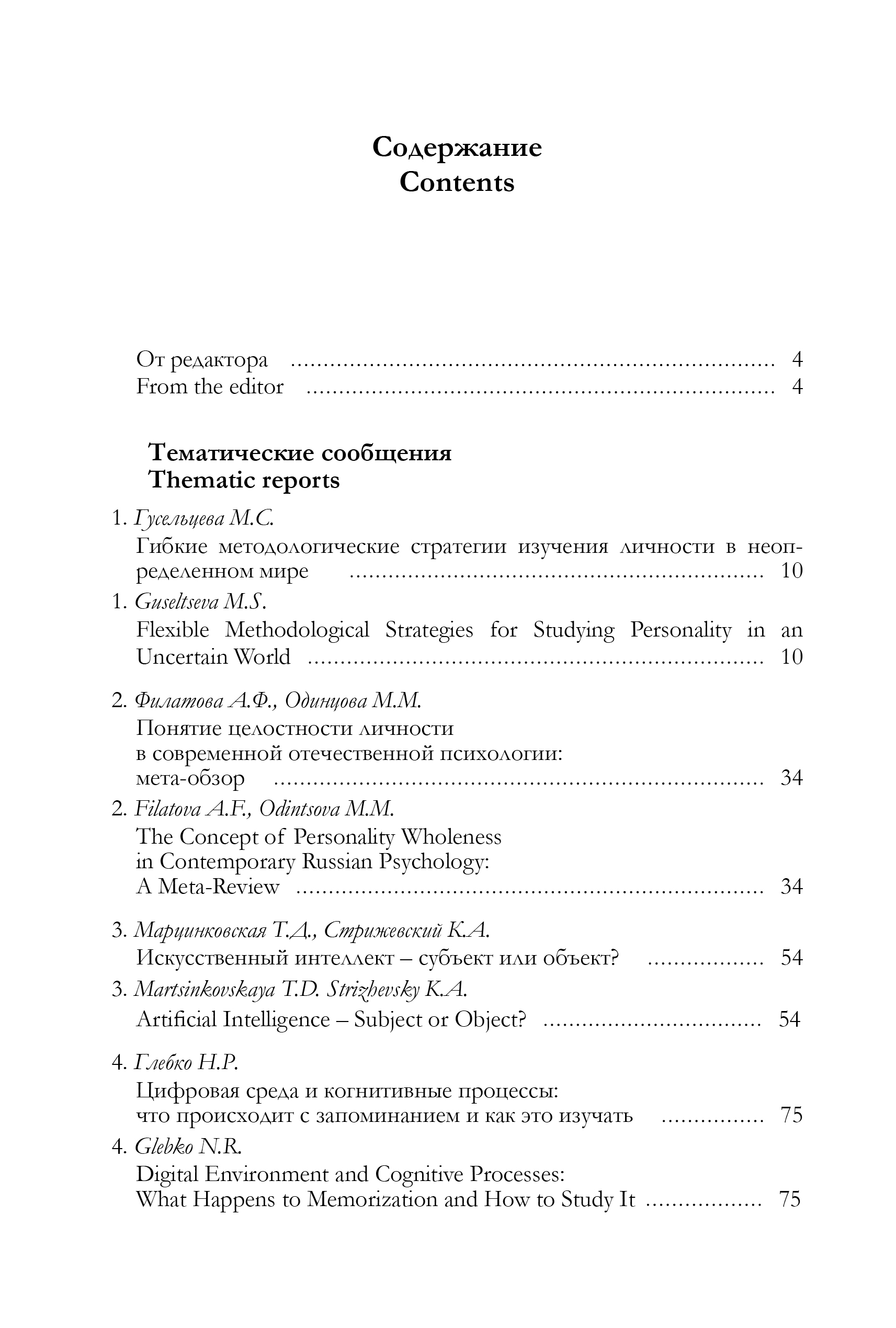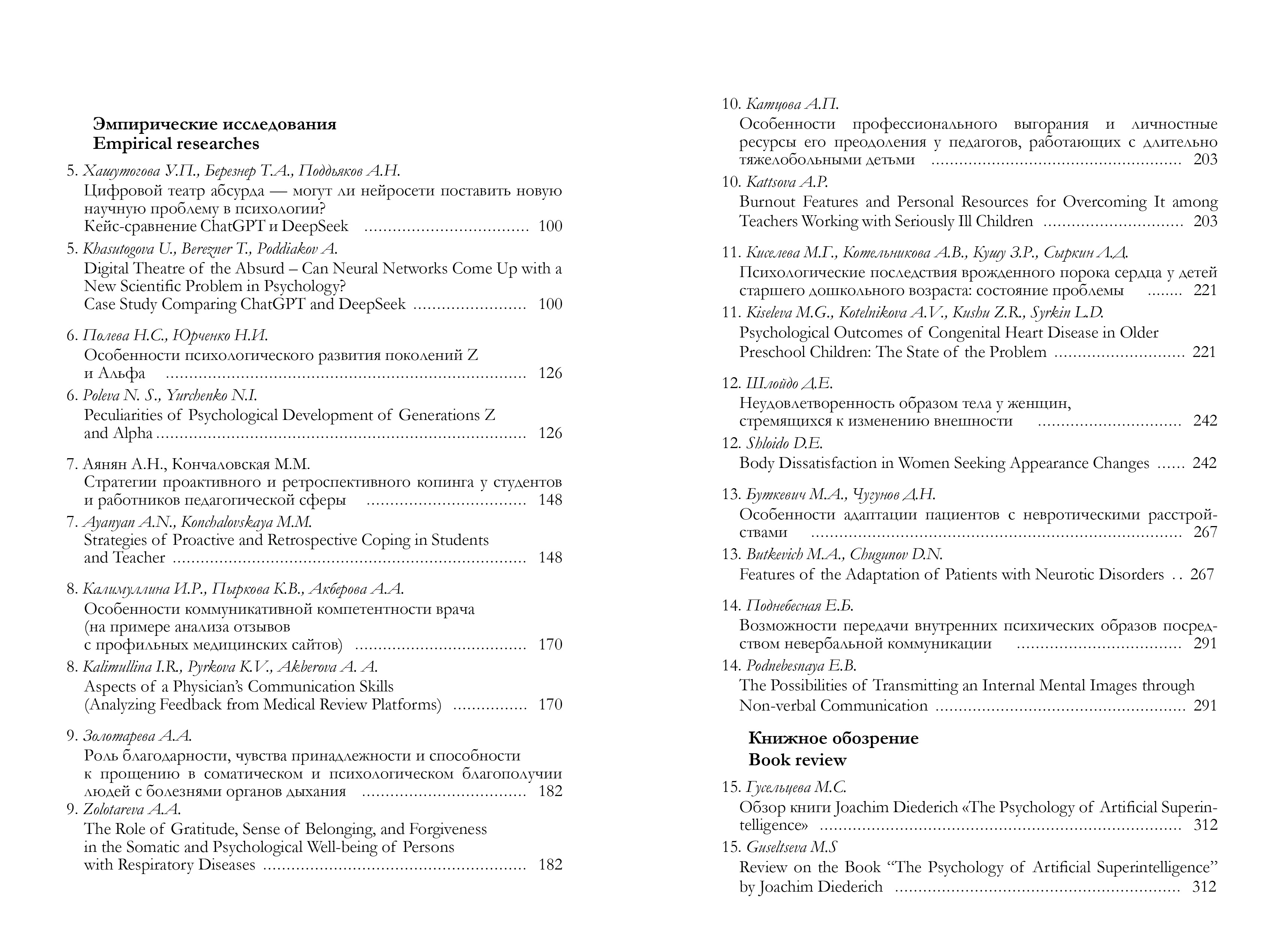From the Editor
Editor-in-chief of the journal «New psychological research» T. D. Martsinkovskaya, Moscow, 8 October 2025
Dear colleagues, I am glad to present the third issue of our journal.
The journal presents researches on various aspects of contemporary psychology. However, there is the leading theme of this issue, which is related to one of the most pressing problems – the psychology of artificial intelligence.
This issue opens with article by M.S. Guseltseva “Flexible Methodological Strategies for Studying Personality in an Uncertain World”. The article explores the complexity of studying personality in the modern world, which requires a transdisciplinarity and flexible approach for investigating personality and its phenomenology in a changing world. It proposes supplementing psychological and sociological studies with anthropological and ethnographic materials.
The problem of studying personality integrity is explored in A.F Filatova and M.M. Odintsova’s article “The Concept of Personality Wholeness in Contemporary Russian Psychology: A Meta-Review” This article presents approaches to studying personality integrity in contemporary Russian literature. The authors demonstrated that when examining the structural, static, and dynamic properties of personality, the researcher’s interest focus on the interaction of tendencies toward stability and variability in the personality system.
The article by M.G. Kiseleva, A.V. Kotelnikova, Z.R. Kushu, and L.D. Syrkin “Psychological outcomes of congenital heart disease in older preschool children: the state of the problem” presents a comprehensive analysis of studies devoted to cognitive and emotional functioning in children with congenital heart defects. It was found that the cognitive and emotional state of preschoolers with congenital heart defects depends on many factors, and the specific social developmental situation in such children can be an additional negative factor in the expansion of cognitive and emotional disorders.
T.D. Martsinkovskaya and K.A. Strizhevsky in their article “Artificial Intelligence: Subject or Object?” examining concepts of creativity and the subjectivity of artificial intelligence, analyze the ideas of philosophers and psychologists who observe the strengths and weaknesses of various theories of artificial intelligence and its application in fundamental and applied researches.
N.R. Glebko in his article “Digital environment and cognitive processes: what happens to memorization and how to study it” demonstrates the importance of developing new approaches to studying memory in the digital environment. The author proposes a typology of digital users and a modified questionnaire that allows to consider individual differences in digital behavior.
In their article “Digital theatre of the absurd – can neural networks come up with a new scientific problem in psychology? Case study comparing ChatGPT and DeepSeek” U. Khasutogova, T. Berezner, A. Poddiakov analyzed the solutions to this new problem using two neural network models: ChatGPT and DeepSeek. The authors demonstrated that the models are capable of generating fundamentally new problems and its solutions, as well as self-reflecting, identifying the strengths and weaknesses of their own responses.
The following articles examine representatives of generations that are primarily focused on the new opportunities offered by the internet and neural networks.
The article “Peculiarities of psychological development of generations Z and Alpha” by N.S. Poleva and N.I. Yurchenko emphasizes the increasing influence of digital technologies on representatives of these generations. The obtained data, as expected, revealed a higher degree of personal and cognitive maturity in Generation Z, as well as differences in the degree of engagement and use of digital space.
The article by A.N. Ayanyan and M.M. Konchalovskaya “Strategies of proactive and retrospective coping in students and teachers” demonstrated, that future teachers and psychologists share common coping strategies such as proactive coping and strategic planning.
Equally important to our authors were the challenges facing doctors, patients, and parents of sick children.
The article by I.R. Kalimullina, K.V. Pyrkova, and A.A. Akberova, “Characteristics of physician communicative competence (based on the analysis of reviews from specialized medical websites)”, demonstrated the importance of communication in doctor-patient interactions and identified the patient's key expectations from communication with the doctor.
In the article by A.A. Zolotareva “The role of gratitude, sense of belonging, and forgiveness in the somatic and psychological well-being of persons with respiratory diseases” were identified links between somatic and psychological characteristics and concluded that psychological resources are important for treating respiratory diseases.
A.P. Kattsova, in her article “Burnout features and personal resources for it overcoming among teachers working with seriously ill children” presented data on correlations between burnout levels and personal characteristics, as well as materials on burnout overcoming strategies.
D.E. Shloido's article “Body image dissatisfaction in women seeking appearance changes” presents data demonstrating that women with eating disorder symptoms demonstrate an increased interest in cosmetic surgery. They are characterized by pronounced dissatisfaction with their body image and the belief that body image affects their quality of life and well-being. However, for some patients, cosmetic surgery does not resolve the problem of dissatisfaction with their appearance.
The article by M.A. Butkevich and D.N. Chugunov, “Features of the adaptation of patients with neurotic disorders”, presents materials demonstrating the specific of adaptation patterns of the studied patients, as well as possible mechanisms of their sanogenesis and psychological adaptation.
E.B. Podnebesnaya, in her article “The possibilities of transmitting internal mental images through non-verbal communication” demonstrates that mediated perception can play a role in orienting activity on the internal plane in situations of uncertainty.
Continuing the theme of artificial intelligence, M.S. Guseltseva presents a review of Joachim Diederich's book, “The Psychology of Artificial Superintelligence”.
His monograph, “The Psychology of Artificial Superintelligence”, is a comprehensive study of the psychological consequences of human interaction with highly developed forms of AI. The book's main conclusion is that advanced forms of artificial intelligence impact not only developers and users but also on those who do not interact with the AI directly. This influence becomes part of the general cultural and psychological background of modern life.


Received: 08th october 2025
Published: 08th october 2025